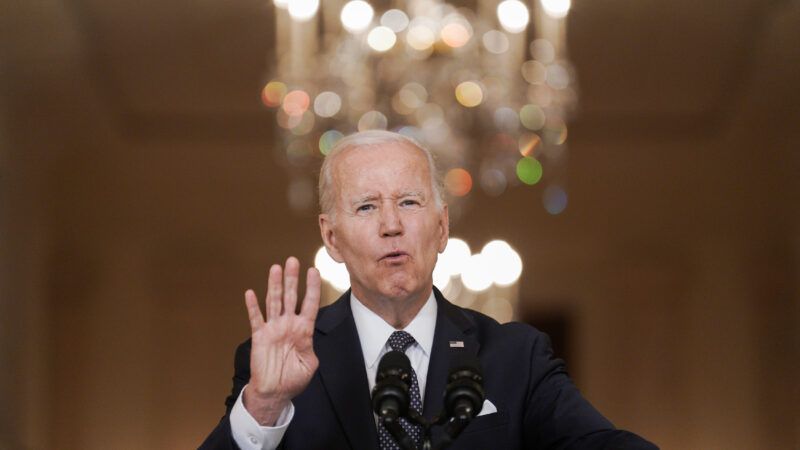Would These 4 Gun Controls Prevent Mass Shootings?
An analysis of such crimes suggests the president’s policy prescriptions are unlikely to have a meaningful impact.

The New York Times reckons that four gun control measures Congress is considering "might have changed the course of at least 35 mass shootings" since 1999—one-third of attacks in which a gunman killed at least four people. While that conclusion is excessively optimistic, the newspaper is at least asking the right question: Are new restrictions on firearms likely to work as advertised?
President Joe Biden, by contrast, simply assumes the wisdom of the policies he favors and the bad faith of anyone who opposes them. "The issue we face is one of conscience and common sense," he insisted last week, implying that skeptics lack one or both.
Among other things, Biden wants Congress to require background checks for private gun transfers, which means such transactions must be completed through a federally licensed dealer. The Times found that four of the mass killers in the 105 cases it examined bought guns in private transactions.
One of those perpetrators had already failed a background check. One of the other three, the Violence Policy Center reports, "legally bought" a pistol from a gun shop. According to a 2013 review in The Atlantic, it is not clear whether either of the two other killers had disqualifying criminal or psychiatric records.
In at least one case out of 105, then, an expanded federal background-check requirement might have been an obstacle. But that's assuming private sellers generally would comply with that mandate, and data from states that notionally require "universal background checks" suggest such rules are widely flouted.
The Times found that at least 20 mass murderers used magazines that held more than 10 rounds. The 1994 federal "assault weapon" law, which expired in 2004, prohibited the production and sale of such magazines, and Biden wants Congress to renew that limit.
Even if we assume that the need to switch magazines after firing 10 rounds can make an important difference in mass shootings, the effectiveness of a ban is doubtful. A 2004 report commissioned by the Justice Department found that the 1994 ban had no measurable impact on the use of "large capacity magazines" in crimes, probably "due to the immense stock of exempted pre-ban magazines"—a stock that is even bigger now than it was then.
In 10 of the 105 mass shootings analyzed by the Times, the perpetrators used stolen guns. The paper suggests "safe storage" legislation backed by Biden might have made a difference in those cases.
One such bill would establish a $500 fine for gun owners who fail to secure their weapons in circumstances where a minor "is likely to gain access" to them or in households where a resident is legally barred from possessing firearms. If a minor or prohibited person uses an unsecured gun to injure or kill someone, the owner would face up to five years in prison.
The bill also would provide grants aimed at encouraging states to establish and enforce similar requirements. The idea that such laws could prevent would-be mass shooters from obtaining firearms assumes wide compliance and a lack of alternative sources, both of which are debatable assumptions.
The Times says "four of the gunmen might have been stymied" by a law prohibiting federally licensed gun dealers from selling semiautomatic centerfire rifles that accept detachable magazines to anyone younger than 21. That bill, which Biden also supports, avoids the arbitrary distinctions drawn by "assault weapon" bans, which target guns based on functionally unimportant characteristics.
Since the bill does not apply to private transfers, however, adult buyers younger than 21 could still legally obtain semiautomatic rifles. Furthermore, a federal appeals court ruled last month that prohibiting young adults from buying such firearms because a tiny fraction of them might commit violent crimes was inconsistent with the Second Amendment.
Before deciding whether to support policies like these, legislators should rationally weigh their costs and benefits, including their constitutional implications. Biden prefers a different approach, replacing logic and evidence with self-righteous certitude.
© Copyright 2022 by Creators Syndicate Inc.


Show Comments (284)